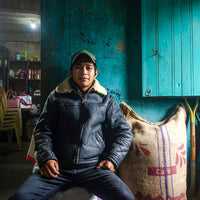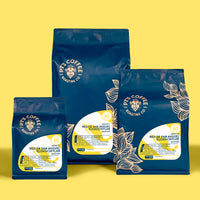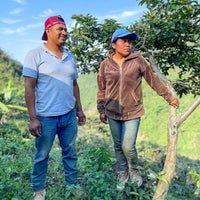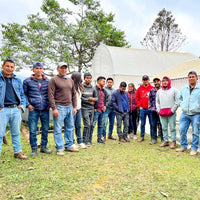Mexico
Red de San Miguel Eloxochitlán Washed
Caramel, Cherry, Graham Cracker




Mexico
Red de San Miguel Eloxochitlán Washed
Caramel, Cherry, Graham Cracker
Delightfully sweet and round-bodied. Aromas of cherry, candied almond, and fudge invite your first sip. We noted flavors of dried cherry, caramel, and pecan. A soft, orange zest-like acidity is balanced by a graham cracker sweetness, all culminating in a finish of chocolate pudding and pineapple.
Producer: Red de San Miguel Eloxochitlán
Farm: 18 Smallholders
Region: Sierra Negra, Puebla
Altitude: 1,650-2,000 masl | 5,413-6,562 feet
Varietal: Marsellesa, Obata, Gesha
Process: Washed
Roast: Light
Notes: Caramel, Cherry, Graham Cracker
Imported by our friends at Crop to Cup—read their full Mexico 2023 Harvest Update on their blog!
"In 2017, a small group of young coffee producers in the Nahuatl community came together to improve the lives of their families and community. Instead of traveling to the border to work in agriculture–often being underpaid–they decided to work together to improve the coffee plantations they had recently inherited. Pooling their resources, they were able to renovate the plantations with new plantings of rust-resistant Costa Rica 95.
"In 2020, the group utilized the Rural Development Secretariat's equipment program to acquire mowers, coffee de-pulpers, and drying tunnels. They also trained in coffee processing in the field school. By 2022, their coffees had scored in the Top 30 of the Puebla of Pride coffee competition.
"By 2023, six of their coffees placed in the Top 10, with the highest scoring 90.25 points. In just a few short years, this group's hard work has taken them from being underpaid migrant field workers to esteemed specialty coffee producers."
Fermin Temoxtle Rodriguez began growing coffee at age 34 as a way to create opportunity and greater income for himself and his family. Before coffee, Fermin—born to indigenous parents in San Miguel Eloxochitlán, one of the twelve poorest municipalities in Mexico—worked in the asparagus fields of Baja California as a migrant worker, leaving home for 3-5 months each year during the harvest.
The work was grueling; most of his days were spent crouching in the fields while temperatures routinely exceeded 110ºF. Some years he wasn’t able to make much—but what he did earn, he saved.
Opportunity presented itself when a group of friends told him about a coffee plantation renovation project in Puebla. Fermin joined 17 other people between the ages of 20 and 40 in replanting the farm with Costa Rica 95, a cultivar they were told was resistant to coffee leaf rust and would adapt to the area. In 2017, on his then- 1 hectare plot on the farm, at 1,650 meters above sea level, he planted 3,300 trees. In 2018, he planted an additional quarter hectare with 1,100 Obatã trees—making him the only producer locally with the cultivar. Each day during the harvest, Fermin leaves home at 6AM to walk an hour to his plot and returns at 9PM, overseeing 5 men and 5 women that he employs to collect and process cherry—generating additional jobs and income for indigenous families in his community.
In 2021, he trained in anaerobic fermentation and processing practices taught by the Secretary of Rural Development and subsequently used honey processing for coffees he submitted to the Pride of Puebla competition that year. He continued training to improve his coffee fermentation, nutrition and storage techniques. In 2023, Fermin again participated in the Pride of Puebla competition, submitting a 72-hour anaerobic dry processed coffee which earned a score of 90.25 and placement as the best coffee in the state of Puebla.
The daughter of parents of Nahuatl indigenous origin from Macuiltepec in San Miguel Eloxochitlán, Mercedes Galvez Andrés established a 1/4 hectare coffee plot with Anacafe 14 plants at the age of 27. Leaving behind her job as a teacher in an indigenous school, Mercedes and her husband joined the group of 17 Nahuatl people from her community in renovating a coffee plantation. A year later, she added 1,200 Obatã plants to her plot.
In pursuit of improving the quality of her production, Mercedes joined the field school of the Rural Development Secretariat of the government of Puebla in 2021, where she trained in agricultural and processing practices. That same year, she was encouraged to participate in the Pride of Puebla competition for the first time. After additional training, in the 2023 Pride of Puebla competition she competed with honey processed Anacafe 14 and Obatã lots, placing in the top 10 of lots participating in the auction.
Bernabé Herrera established a half-hectare plot of Costa Rica 95 variety coffee in San Miguel Eloxochitlán in 2017 as a way to improve the quality of life for himself, his wife and their 5-year old son. Before coffee, he, like many others in his community, would migrate to the north of the country for work in agriculture, being apart from his family for months each year. In 2022, he continued renovations of the farm with Obatã trees to obtain better cup quality. Through his farm management, Bernabé has created employment for 5 women who, with him, help with selective picking, processing, and drying.
In 2022, Bernabé participated in the Pride of Puebla cup competition for the first time, achieving a score of 85 for the coffee he submitted. In 2023, he continued improving his processing and resubmitted to the competition, scoring in the top 10 and achieving a score of 87.47 for his coffee.




